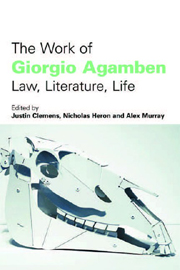Book contents
- Frontmatter
- Contents
- Acknowledgements
- Notes on Contributors
- The Enigma of Giorgio Agamben
- 1 K
- 2 Integral Actuality: On Giorgio Agamben's Idea of Prose
- 3 The Role of the Shifter and the Problem of Reference in Giorgio Agamben
- 4 ‘Its Silent Working was a Delusion’
- 5 Politics and Poetics of Divine Violence: On a Figure in Giorgio Agamben and Walter Benjamin
- 6 Idea of Poetry, Idea of Prose
- 7 The Fading Memory of Homo non Sacer
- 8 Soulblind, or On Profanation
- 9 Face to Face with Agamben; or, the Other in Love
- 10 Beyond Spectacle and the Image: the Poetics of Guy Debord and Agamben
- 11 Dismantling Theatricality: Aesthetics of Bare Life
- 12 Notes on Media and Biopolitics: ‘Notes on Gesture’
- Index
1 - K
Published online by Cambridge University Press: 12 September 2012
- Frontmatter
- Contents
- Acknowledgements
- Notes on Contributors
- The Enigma of Giorgio Agamben
- 1 K
- 2 Integral Actuality: On Giorgio Agamben's Idea of Prose
- 3 The Role of the Shifter and the Problem of Reference in Giorgio Agamben
- 4 ‘Its Silent Working was a Delusion’
- 5 Politics and Poetics of Divine Violence: On a Figure in Giorgio Agamben and Walter Benjamin
- 6 Idea of Poetry, Idea of Prose
- 7 The Fading Memory of Homo non Sacer
- 8 Soulblind, or On Profanation
- 9 Face to Face with Agamben; or, the Other in Love
- 10 Beyond Spectacle and the Image: the Poetics of Guy Debord and Agamben
- 11 Dismantling Theatricality: Aesthetics of Bare Life
- 12 Notes on Media and Biopolitics: ‘Notes on Gesture’
- Index
Summary
1. In Roman law, in which prosecution had a limited role, slander (calumnia, in old Latin kalumnia) represented so serious a threat for the administration of justice that the false accuser was punished by the branding of the letter K (the initial of kalumniator) on his forehead. It is Davide Stimilli's merit to have demonstrated the importance of this fact for the interpretation of Kafka's Trial, which the incipit unreservedly presents as a slanderous trial (‘Someone must have slandered Josef K., for one morning, without having done anything wrong, he was arrested’). K., Stimilli suggests, recalling that Kafka had studied the history of Roman law while he prepared for the legal profession, does not stand – according to the common opinion that goes back to Max Brod – for Kafka, but for kalumnia, slander.
2. That slander represents the key to the novel (and, perhaps, to Kafka's entire universe, so powerfully marked by the mythic powers of the law) becomes even more illuminating, however, if one observes that, since the letter K. does not stand simply for kalumnia, but refers to the kalumniator – that is, to the false accuser – this can only mean that the false accuser is the very protagonist of the novel, who has, so to speak, brought a slanderous trial against himself. The ‘someone’ (jemand) who, with his slander, has initiated the trial is Josef K. himself.
But this is precisely what an attentive reading of the novel demonstrates beyond any doubt. Indeed, although K. may know all along that it is not at all certain that the court has accused him (‘I can’t report that you’ve been accused’,2 the inspector says to him in the first interview), and that, in any case, his ‘arrested’ condition does not entail any change in his life, he seeks to enter the court buildings anyway (which are not really court buildings, but attics, lumber rooms and laundries, which, perhaps, only his gaze transforms into courtrooms) and to bring about a trial that the judges seem to have no intention of initiating.
- Type
- Chapter
- Information
- The Work of Giorgio AgambenLaw Literature Life, pp. 13 - 27Publisher: Edinburgh University PressPrint publication year: 2008



